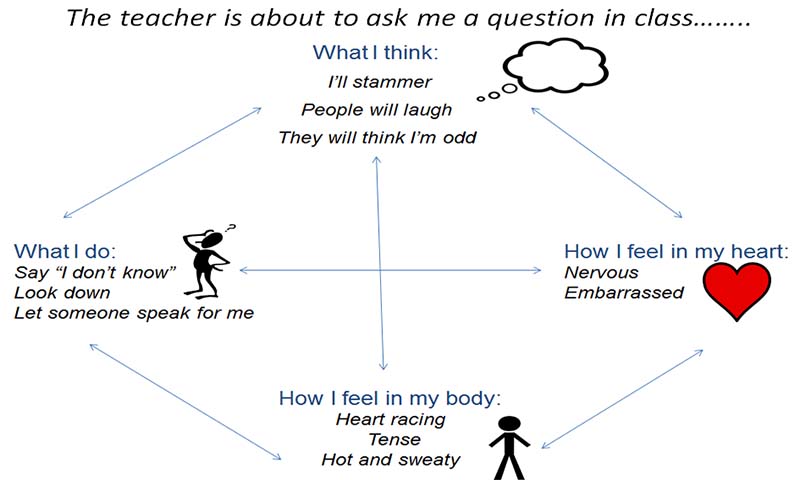
Managing anxiety with the MPC
This video by Australian psychologist, Russ Harris, explains it.
Understanding anxiety can help you to manage it better.
What’s going on in the brain?
When you feel anxious it means that you’re on alert. The amygdala is the part of the brain that acts like an early warning system to alert the rest of the brain about possible danger. Your brain reacts with with a fight or flight response which means that your system gets flooded with cortisol and norephinephrine. This results in you feeling tense or your heart rate increasing as your body gets ready to deal with danger.
Anxiety and thinking – expecting the worst
When human beings feel nervous or anxious it’s usually because they are expecting the worst. What goes through your mind if you know you’ll have to speak and you think you’ll stammer? Do thoughts like this show up?
- I won’t be able to speak
- Everyone will laugh at me, or snigger, or tease me about stammering
- They’ll think there’s something wrong with me
- They’ll think I’m weird
- They won’t want to talk to me
A ‘vicious cycle’
If you get caught up in predicting the worst, predicting that you will be rejected, or comparing yourself to others this may help to explain how you feel, how your body feels and also why you might decide to not speak or not join in something – it just feels too risky. Unfortunately we can all end up in vicious cycles where how we cope with something makes it worse rather than better.
In this example, deciding to not speak might make the situation even more scary next time and it means you don’t get the chance to find out that it might have been ok – that you might not have stammered or, if you did, that people might not have laughed or acted differently.

If you notice that worry or anxiety stops you sleeping or makes you decide not to do things that you really want to do then these ideas could help.
What can I do?
- Have a go at thinking something more helpful, like “Everyone knows I sometimes stammer”, or “I can handle it.”
- Use your breathing to help ease your way through the anxiety. If you have been taught mindfulness in school then try some of the techniques you were shown, like doing a FOFBOC. If you haven’t been taught mindfulness at school then try taking three slow and gentle breaths to help your system slow down and come out of ‘on-alert’ mode.
- Remind yourself that it’s ok to stammer. This means challenging the idea that you might have that you shouldn’t stammer.
- Remember that human beings have brains that are more likely to notice negative information than positive. Look out for the times when you stammer and people don’t particularly react, or when they are interested in what you say rather than how it comes out. This means training your brain to look for stuff that you might normally miss.
- Make a plan. What will you do supposing you do stammer, or if someone does do something unhelpful like laugh or say something. Having a plan will help you feel you can handle it.
- Max out your communication skills so that you look confident (even if you don’t feel it inside). Whether or not you stammer is less important to how you come across than you might think so concentrate on looking at people, listening to what they are saying, smiling and saying what you want to say.
Try mindfulness if anxiety stops you sleeping
This comes from the Mindfulness in Schools Programme (MiSP). It is a 10 minute meditation to help you sleep when you’re worrying about things – that’s why it’s called “Beditation.”
Researchers are looking at whether mindfulness increases adolescents’ wellbeing, resilience and focus. If you are wondering whether mindfulness might help you find out if your school has any mindfulness classes and give it a go.
I’m not coping

If this is how you feel then it is important to tell someone. Talk to a parent or carer, teacher, school counsellor or your GP and let them know.

Sometimes you just need someone to talk to


Sometimes you just need someone to talk to
Our Helpline, 020 3316 8100, is open during office hours (9am-5pm) and voicemail messages can be left when the office is closed.
“It was extremely helpful just talking about how I felt about my stammer and different stuff like that.”
Become a Friend
Receive emails with news and information about the Centre's work, events, and fundraising.
Sign up